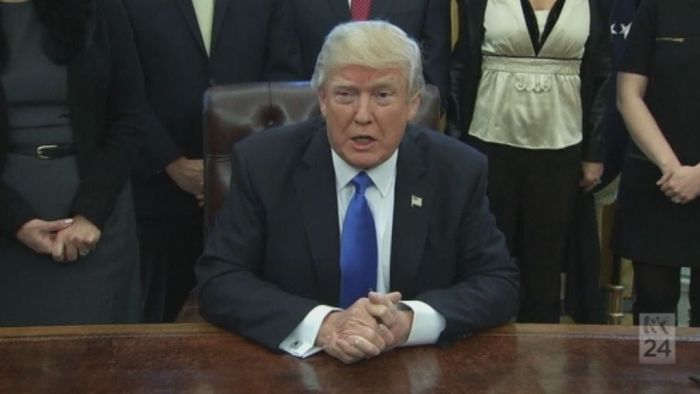Trump to lift travel ban for Iraq in new executive order, White House official says
Updated
 Photo:
A White House official said the revised travel ban list is expected to be signed on Monday. (Reuters: Carlos Barria)
Photo:
A White House official said the revised travel ban list is expected to be signed on Monday. (Reuters: Carlos Barria)
US President Donald Trump will remove Iraq from a list of countries targeted in a US travel ban when he signs a new executive order, after his controversial first attempt was blocked in the courts, a White House source says.
Key points:
- Iraq's new vetting procedures cited as reason for being removed from list
- Legal residents, green card holders, refugees in transit reportedly exempt from new ban
- Indefinite suspension of Syria also scrapped
The senior White House official said the new order would keep a 90-day ban on travel to the United States by citizens of six Muslim-majority nations — Iran, Libya, Syria, Somalia, Sudan and Yemen.
Iraq will officially be taken off the list of countries in the original order, issued on January 27, because the Iraqi Government had imposed new vetting procedures, such as heightened visa screening and data sharing, and because of its work with the US in countering Islamic State militants, the official said.
Thousands of Iraqis have fought alongside US troops for years or worked as translators since the US-led invasion in 2003.
Many have resettled in the United States following threats for working with US troops.
The White House official said the new executive order, which the Republican President is expected to sign on Monday, also ensures that tens of thousands of legal permanent residents in the US — or green card holders — from the listed countries would not now be affected by the travel ban.
More than two dozen lawsuits were filed in US courts against the original travel ban, and the state of Washington succeeded in having it suspended by the 9th Circuit Court of Appeals by arguing that it violated constitutional protections against religious discrimination.
Mr Trump publicly criticised the judges who ruled against him and vowed to fight the case in the Supreme Court, but then decided to draw up a new order with changes aimed at making it easier to defend in the courts.
The Iraqi foreign ministry expressed "deep relief" in a statement on Monday.
"The decision is an important step in the right direction, it consolidates the strategic alliance between Baghdad and Washington in many fields, and at their forefront war on terrorism," the statement said.
A more cautious implementation
While the first order imposed restrictions immediately, the new directive would have an as-yet undefined implementation delay to limit the disruptions that created havoc for some travellers, the official said.
Refugees who are "in transit" and have already been approved would be able to travel to the United States.
Mr Trump's original order barred travellers from the seven nations from entering for 90 days and all refugees for 120 days.
Refugees from Syria were to be banned indefinitely, but under the new order they are not given separate treatment.
"This executive order has scrapped that division and the indefinite suspension, and has collapsed them into a single category of a 120-day suspension," the official said.
The new order launches a 90-day period for the Department of Homeland Security (DHS) to define a new series of requirements for countries to have full participation in US entry programs.
For countries that do not comply, the US State Department, the DHS and intelligence agencies can make recommendations on what, if any, restrictions should be imposed.
"It's not an all-or-nothing scenario," the official said.
Reuters
Topics: donald-trump, world-politics, immigration, united-states, syrian-arab-republic, sudan, somalia, libyan-arab-jamahiriya, yemen, iraq
First posted











